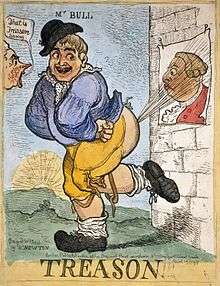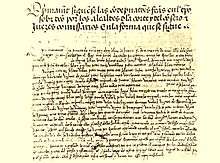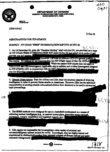Lèse-majesté
Lèse-majesté (/ˌlɛzˌmæʒɛsˈteɪ/[1] or /ˌliːz ˈmædʒɪsti/;[2]), a French term meaning "to do wrong to majesty", is an offence against the dignity of a reigning sovereign or against a state.

| Criminal law | |
|---|---|
| Elements | |
| Scope of criminal liability | |
| Severity of offense | |
|
|
| Inchoate offenses | |
| Offence against the person | |
|
|
|
| Sexual offences | |
| Crimes against property | |
| Crimes against justice | |
| Crimes against the public | |
|
|
| Crimes against animals | |
| Crimes against the state | |
| Defences to liability | |
| Other common-law areas | |
| Portals | |
|
|
| Part of a series of articles on |
| Monarchy |
|---|
.svg.png) |
|
Central concepts |
|
History
|
| Politics portal |
This behaviour was first classified as a criminal offence against the dignity of the Roman Republic of ancient Rome.[3] In the Dominate, or Late Empire period, the emperors eliminated the Republican trappings of their predecessors and began to equate the state with themselves.[4] Although legally the princeps civitatis (his official title, meaning, roughly, 'first citizen') could never become a sovereign because the republic was never officially abolished, emperors were deified as divus, first posthumously but by the Dominate period while reigning. Deified emperors enjoyed the same legal protection that was accorded to the divinities of the state cult; by the time it was replaced by Christianity, what was in all but name a monarchical tradition had already become well-established.
Narrower conceptions of offences against Majesty as offences against the crown predominated in the European kingdoms that emerged in the early medieval period. In feudal Europe, some crimes were classified as lèse-majesté even if they were not intentionally directed against the crown. An example is counterfeiting, so classified because coins bore the monarch's effigy and/or coat of arms.
With the disappearance of absolute monarchy in Europe (with exception of Vatican City), lèse-majesté came to be viewed as less of a crime. However, certain malicious acts that would have once been classified as the crime of lèse-majesté could still be prosecuted as treason. Future republics that emerged as great powers generally still classified as a crime any offence against the highest representatives of the state. These laws are still applied as well in monarchies outside of Europe, such as modern Thailand and Cambodia.
Current laws
Europe
In Italy, Switzerland,[5] and Poland it is illegal to insult foreign heads of state publicly.
- On 5 January 2005, left-wing magazine Nie publisher Jerzy Urban was sentenced by a Polish court to a fine of 20,000 złoty (about €5,000, £3,400 or US$6,200) for having insulted Pope John Paul II, a visiting head of state.[6]
- On 26–27 January 2005, 28 human rights activists were temporarily detained by the Polish authorities for allegedly insulting Vladimir Putin, a visiting head of state. The activists were released after about 30 hours and only one was actually charged with insulting a foreign head of state.[7]
Denmark
In Denmark, the monarch is protected by the usual libel paragraph (§ 267 of the penal code which allows for up to four months of imprisonment), but §115[8] allows for doubling of the usual punishment when the reigning monarch is target of the libel. When a queen consort, queen dowager or the crown prince is the target, the punishment may be increased by 50%. There are no historical records of §115 having ever been used, but in March 2011, Greenpeace activists who unfurled a banner at a dinner at the 2009 United Nations Climate Change Conference were charged under this section.[9] They received minor sentences for other crimes, but were acquitted of the charge relating to the monarch.[10]
Germany
Until 2017, it was illegal to publicly insult foreign heads of state. On 25 January 2017, the German Justice Minister Heiko Maas announced a decision by the Cabinet to remove this law from the German criminal code, effective 1 January 2018.[11] The decision came several months after Chancellor Angela Merkel announced in April 2016 a controversial decision to honor the Turkish government's request to prosecute a German comedian for reading an obscene poem about Turkish President Recep Tayyip Erdoğan on late-night television. In that announcement, Merkel also stated the intention to consider repeal of the little-known law.[12] The prosecution was dropped in November 2016.[13]
Insulting the Federal President is still illegal,[14] but prosecution requires the authorisation of the President.
Iceland
Insulting a country, foreign head of state, its representatives or flag can be punished by up to two years of imprisonment according to the 95th article of the penal code. For a very serious breach the term can be extended to 6 years.[15]
Netherlands
In 1966, Dutch cartoonist Willem depicted queen Juliana of the Netherlands as a prostitute in a cartoon published in Provo magazine God, Nederland en Oranje. He was sued for lèse-majesté, but the judge eventually acquitted him from the charge.[16] Willem moved to France afterwards.
In April 2018, the maximum punishment for lèse-majesté was reduced to 4 months, making it similar to that for insulting police officers and emergency workers.[17]
Before this amendment, for insulting the king, the heiress apparent, and their relatives, an offender may have received up to five years' imprisonment plus a fine.[18]
In total, 18 prosecutions were brought under the law between 2000 and 2012, half of which resulted in convictions.[19] In October 2007, a 47-year-old man was sentenced to one week's imprisonment and fined €400[20] for, amongst other things, lèse-majesté in the Netherlands when he called Queen Beatrix a "whore" and told a police officer that he would have anal sex with her because "she would like it".[21] In July 2016, a 44-year-old man was sentenced to 30 days in jail for 'intentionally insulting' King Willem-Alexander, accusing him of being a murderer, thief and rapist.[19]
Russia
In March 2019, Russia's Federal Assembly has passed the law for criminalising fake news or insulting the Russian president, the prime minister, and foreign heads of state, then facing up to 15 days imprisonment,[22] and fined up to 30,000 rubles.[23]
Spain

Articles 490 and 491 of the criminal code govern lèse-majesté. Any person who defames or insults the king, the queen, their ancestors or their descendants can be imprisoned for up to two years.[24] The Spanish satirical magazine El Jueves was fined for violation of Spain's lèse-majesté laws after publishing an issue with a caricature of the then Prince of Asturias and his wife engaging in sexual intercourse on the cover in 2007.[25]
Middle East
Kuwait
In January 2009 there was a diplomatic incident between Australia and Kuwait over an Australian woman being held for allegedly insulting the Emir of Kuwait during a fracas with Kuwaiti immigration authorities.[26]
Jordan
In September 2012, pro-reform activists faced charges of lèse-majesté following protests in two locations in Jordan. The protests turned violent after the activists reportedly chanted slogans against the Jordanian regime and insulted King Abdullah II and the Royal Court.[27]
In August 2014, Mohammad Saeed Baker, a member of the Muslim Brotherhood's shura council, was arrested in Jordan and sentenced to six months in prison for lèse-majesté. He was released in February 2015.[28]
Saudi Arabia
Under the counterterrorism law that took effect in 2014, actions that "threaten Saudi Arabia’s unity, disturb public order, or defame the reputation of the state or the king" are considered acts of terrorism.[29] The offense may carry harsh corporal punishment, including public lashings, lengthy jail terms and even death, the sentences may be determined on a per case basis owing to the arbitrary nature of the Saudi legal system.[30]
Africa
Morocco
Moroccans are routinely prosecuted for statements deemed offensive to the king. The minimum penalty for such a statement is one year's imprisonment if the statement is made in private (i.e. not broadcast), and three years' imprisonment if it is made in public. In both cases, the maximum is 5 years.[31]
The cases of Yassine Belassal[32] and Nasser Ahmed (a 95-year-old who died in jail after being convicted of lèse-majesté), and the Fouad Mourtada Affair, revived the debate on these laws and their applications. In 2008, an 18-year-old was charged with "breach of due respect to the king" for writing "God, Homeland, Barça" on a school board, in reference to his favorite football club and satirising the national motto ("God, Homeland, King").
In February 2012, 18-year-old Walid Bahomane was convicted for posting two mild cartoons of the king on Facebook. The procès-verbal cites two Facebook pages and a computer being seized as evidence. Walid was officially prosecuted for "touching the sacralities".[33]
Asia
Brunei
Lèse-majesté is a crime in Brunei Darussalam as it is punishable with prison sentences for up to three years.[34][35][36]
Cambodia
In February 2018, the Parliament of Cambodia voted to make insulting any monarch punishable with up to one to five years in prison with a fine of 2 to 10 million riels.[37][38]
In January 2019, a Cambodian man was sentenced to three years in jail for Facebook posts. This is the second sentence handed under the law.[39]
Malaysia
Malaysia uses the Sedition Act 1948 to charge people for allegedly insulting the royal institution. In 2013, Melissa Gooi and 4 other friends were detained for allegedly insulting the royal institution.[40]
In 2014, Ali Abd Jalil were detained and served 22 days in prison for insulting the royal family of Johor and Sultan of Selangor. A prison sentence was passed in Johor for attacking the royal family to Muhammad Amirul Azwan Mohd Shakri.[41]
Thailand

Thailand's criminal code has carried a prohibition against lèse-majesté since 1908.[42] In 1932, when Thailand's monarchy ceased to be absolute and a constitution was adopted, it too included language prohibiting lèse-majesté. The 2016 Constitution of Thailand, and all previous versions since 1932, contain the clause, "The King shall be enthroned in a position of revered worship and shall not be violated. No person shall expose the King to any sort of accusation or action." Thai criminal code elaborates in Article 112: "Whoever defames, insults or threatens the King, Queen, the Heir-apparent or the Regent, shall be punished with imprisonment of three to fifteen years." Missing from the code, however, is a definition of what actions constitute "defamation" or "insult".[43] From 1990 to 2005, the Thai court system only saw four or five lèse-majesté cases a year. From January 2006 to May 2011, however, more than 400 cases came to trial, an estimated 15 times increase.[44] Observers attribute the increase to increased polarization following the 2006 military coup and sensitivity over the elderly king's declining health.[44] In 2013, the Supreme Court of Thailand ruled in case no. 6374/2556 that Article 112 of the Penal Code protects the past kings as well as the present one. Criticisms or comments which tarnish past kings or the monarchy is punishable by law. However, scholars raised doubts as to how far back lèse-majesté will be applied as the present Thai monarchy (Chakri Dynasty) dates back more than 200 years while other monarchies which ruled Siam can be traced back almost 800 years.
Neither the king nor any member of the royal family has ever personally filed any charges under this law. In fact, during his birthday speech in 2005, King Bhumibol Adulyadej encouraged criticism: "Actually, I must also be criticized. I am not afraid if the criticism concerns what I do wrong, because then I know." He later added, "But the King can do wrong", in reference to those he was appealing to not to overlook his human nature.[45]
Under the NCPO junta which overthrew the democratic regime in May 2014, charges of lèse-majesté have increased significantly, especially against the opponents of the junta. Lèse-majesté is now seeing increasing use as a tool to stifle free speech and dissent in the country.[46] Even the parents of the former princess Srirasmi Suwadee as well as her uncle have been charged with lèse-majesté. On 9 March 2015, a court sentenced her father Apiruj Suwadee and mother Wanthanee for insulting the royal family and lodging a malicious claim. They pleaded guilty to the offenses named and were sentenced to two-and-a-half years in prison.[47] On 9 June 2017 in Bangkok a 33-year-old Thai man by the first name of Wichai was given 35 years imprisonment for posting 10 Facebook photos and comments about the Thai royalty. This sentence was reduced from initial 70 years following a guilty plea made after a year in jail before the trial.[48]
On June 2017, the United Nations called on Thailand to amend its law on lèse-majesté.[49]
Former laws
Japan
Laws against offending the Emperor of Japan were in place between 1880 and 1947, when the law was abolished, during the Allied occupation. The last person to be convicted of the crime was Shōtarō Matsushima, a factory worker and member of the Japanese Communist Party. During a 1946 protest against food shortages in front of the Imperial Palace, during which the protesters demanded entry into the palace kitchens which were said to be stocked with staple foods, Matsushima wielded a placard reading, on the one side, "Imperial Edict: The Emperor system has been preserved. I, the Emperor, have eaten to my heart's content, but you, my subjects, should starve to death! Signed, (Imperial Seal)". The other side demanded that the Emperor give a public accounting of the food shortages. Matsushima was arrested and charged with impairing the dignity of the Emperor. The Allied occupation authorities intervened and had the charges reduced to libel. Matsushima was convicted and sentenced to eight months in prison, but was pardoned immediately under an Imperial amnesty commemorating the new Constitution.[50]
Norway
Following the 2005 Penal Code (introduced in 2015), lèse-majesté is no longer considered a criminal offense.
The 1902 Penal Code, article 101, provided a fine or up to five years of prison for lèse-majesté.[51] According to article 103, prosecution had to be ordered or accepted by the king.[52] Article 101 stated: "If any defamation is exercised against the King or the Regent, the guilty is punished with a fine or up to five years of prison."[53]
United Kingdom
Section 51 of the Criminal Justice and Licensing (Scotland) Act 2010 abolished the common law criminal offences of sedition and "leasing-making". The latter offence, also known as "lease /ˈliːz/ making", was considered an offence of lèse-majesté or making remarks critical of the monarch of the United Kingdom. The final prosecution for this offence had occurred in 1715.[54]
See also
References
- Collin's English Dicitonary
- "lese-majesty". Oxford English Dictionary (3rd ed.). Oxford University Press. September 2005. (Subscription or UK public library membership required.)
- Oxford Concise Dictionary of Greek and Roman Antiquities A complex development as distinct from treason occurred from kingdom thru empire. Arguably there was no distinction in the republican period.
- TheFreeDictionary.com, "Lese majesty" TheFreeDictionary.com, Columbia Encyclopedia, retrieved 22 September 2006
- Swiss Penal Code , SR/RS 311.0 (E·D·F·I), art. 296 (E·D·F·I)
- "Criminal Defamation Laws Hamper Free Expression", IFEX.org, retrieved 22 September 2006
- NEWS.BBC.co.uk, "Sensitive heads of state", retrieved 30 January 2008
- "Resinformation.dk". retsinformation.dk. Retrieved 26 January 2017.
- "COP-15 activists in lèse majesté case". Politiken. Copenhagen. 1 March 2011. Retrieved 1 March 2011.
- Københavns Byret (22-08-2011). Greenpeace-aktivister idømt betinget fængsel i 14 dage. (in Danish).
- Deutsche Welle, "Berlin abolishing slander law on insulting foreign leaders", Retrieved 30 July 2017
- TheIntercept.com "German Chancellor Refuses to Block Prosecution of Comic Who Insulted Turkey’s President" retrieved 30 July 2017
- Deutsche Welle
- "German Criminal Code, Section 90". Gesetze im Internet. Federal Ministry of Justice (Germany). Retrieved 16 December 2018.
- "Almenn hegningarlög". Retrieved 27 January 2017.
- https://www.lambiek.net/artists/w/willem.htm
- Schuetze, Christopher (11 April 2018). "Dutch Parliament reduces penalties for insulting king". The Sydney Morning Herald. Retrieved 11 May 2019.
- "This is how these 12 countries will punish you for insulting their heads of state". globalpost.com. Retrieved 26 January 2017.
- "Dutchman jailed for 30 days for 'insulting' the king". 14 July 2016. Retrieved 26 January 2017 – via bbc.com.
- "Dutch man jailed for insulting the queen". current.com. Archived from the original on 21 February 2011.
- Rechtbank Amsterdam, 13/420932-07 en 13/421786-06, ECLI:NL:RBAMS:2007:BB1044
- Bennetts, Marc (6 March 2019). "Russia passes law to jail people for 15 days for 'disrespecting' government". The Guardian. Retrieved 19 October 2019.
- "Официальный интернет-портал правовой информации". publication.pravo.gov.ru (in Russian). Retrieved 18 October 2019.
- Spain. Ley Orgánica 10/1995, de 23 de noviembre, del Código Penal [Constitutional Law 10/1995, of 23 November, on the Criminal Code] (in Spanish). BOE no 281, 24 November 1995. Retrieved 16 July 2019.
- "Spain royal sex cartoonists fined". BBC. 13 November 2007. Retrieved 13 November 2007.
- "Australia will not intervene as woman held in Kuwait for emir 'insult' - National". smh.com.au. Retrieved 26 January 2017.
- "Tafileh Reform Activists to be Charged with Slander, Lese Majeste | Jordan News | Ammon News". En.ammonnews.net. 13 September 2012. Retrieved 6 January 2014.
- "Brotherhood member released after serving six-month prison term". jordantimes.com. 2 February 2015. Retrieved 26 January 2017.
- "Saudi writer arrested for insulting long-dead king". Middle East Eye. Middle East Eye. 15 July 2015. Retrieved 1 June 2016.
- "Pakistani commentator Zaid Hamid sentenced to prison, lashing in Saudi Arabia". Gulf News. Gulf News. 4 July 2015. Retrieved 1 June 2016.
- PCB.UB.es Archived 6 January 2010 at the Wayback Machine
- BarcelonaReporter.com Archived 7 July 2011 at the Wayback Machine
- "Busted for Posting Caricatures of the King on Facebook". 8 February 2012. Retrieved 9 February 2012.
- https://theculturetrip.com/asia/brunei-darussalam/articles/11-things-that-are-illegal-in-brunei/
- https://www.brudirect.com/news.php?id=3890
- http://factsanddetails.com/southeast-asia/Brunei/sub5_10a/entry-3602.html
- https://www.reuters.com/article/us-cambodia-politics/cambodian-government-criminalizes-insult-of-monarchy-idUSKBN1FM219
- "Cambodia passes controversial lese majeste law". Deutsche Welle. 14 February 2018.
The 123 members of Cambodia's parliament who were present on Wednesday unanimously adopted a law that forbids insulting the monarchy, imposing stiff financial and custodial penalties on those convicted of the crime. The changes to Cambodia's criminal law were initially drawn up by Prime Minister Hun Sen, and include a penalty of between one and five years imprisonment, along with fines of 2 million riel to 10 million riel ($500 to $2,500). "An insult is expressed in words, gestures, writing, painting or objects that affect personal dignity," Pen Panha, head of the parliamentary Commission on Legislation and Justice, told the assembly.
- Cambodian man jailed for insulting king in Facebook posts The Guardian, 2018
- "[NEW UPDATE] She Insulted Our Agong: Her Friend Surrenders". says.com. Retrieved 26 January 2017.
- Samuels, Gabriel (8 June 2016). "Teenager jailed for insulting Malaysian royal family on Facebook". The Independent.
- "BBC NEWS - Asia-Pacific - Thailand's king pardons Swiss man". bbc.co.uk. Retrieved 26 January 2017.
- Head, Jonathan (9 September 2008). "Writer held for 'insulting' Thai royals". BBC. Retrieved 26 October 2016.
- Todd Pitman and Sinfah Tunsarawuth (27 March 2011). "Thailand arrests American for alleged king insult". Associated Press. Retrieved 27 May 2011.
- "Royal Birthday Address: 'King Can Do Wrong'". National Media. 5 December 2005. Retrieved 26 September 2007.
- "The Thai cleaning lady facing prison for 'I see'". BBC. BBC. 20 May 2016. Retrieved 21 May 2016.
- "Parents of Thai ex-princess given jail term for lese majeste". 11 March 2015. Retrieved 26 January 2017 – via bbc.com.
- Simth, Nicola (9 June 2017). "Man handed 35-year sentence for insulting Thai royal family on Facebook". The Daily Telegraph.
- https://www.bbc.com/news/world-asia-40298570#
- p. 242, Eiji Takemae: The Allied Occupation of Japan (Continuum International Publishing Group, 2003)
- Straffeloven, § 101 at Lovdata.no
- Straffeloven, § 103 at Lovdata.no
- Norwegian: Forøves nogen Ærekrenkelse mod Kongen eller Regenten, straffes den skyldige med Hefte eller Fængsel indtil 5 Aar.
- "Justice Committee Official Report". Scottish Parliament. 20 April 2010. Retrieved 4 January 2014.
External links

